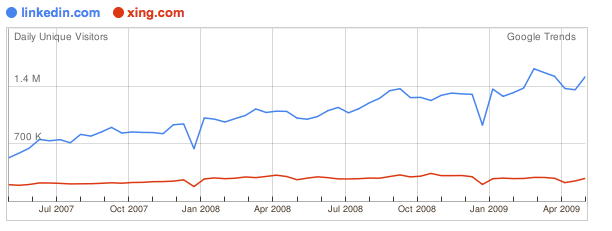 LinkedIn has bolstered its position as America’s leading business social network by the month lately, with Germany-based Xing as the only company regarding itself a worthy competitor in the last few years. But now those days seem to be over – in the US and China, at least.
LinkedIn has bolstered its position as America’s leading business social network by the month lately, with Germany-based Xing as the only company regarding itself a worthy competitor in the last few years. But now those days seem to be over – in the US and China, at least.
Today German newspaper Hamburger Abendblatt published an interview [GER] with Xing CEO Stefan Groß-Selbeck (who recently replaced founder Lars Hinrichs), and he revealed a couple of interesting tidbits of information about the future direction of his company (find a horrible, Google-translated version of the full interview in English here).
Talking in broad strokes, Groß-Selbeck said 3.5 million of the 7.5 million Xing members are based out of Germany, Austria and German-speaking Switzerland. This isn’t really that surprising, given the background of the company. But the interview also marks the first time a Xing representative publicly (albeit indirectly) admitted losing in the USA and China.
Groß-Selbeck said he rather sees Xing’s future in those countries where the company has opened offices: Spain, Italy and the rapidly growing web market of Turkey. This statement was followed by him dodging a question about Xing’s previous plans to enter the US and China (he specifically responded that the focus lies on said countries and Xing plans to double its German user base in the next years). In other words, Xing seems to have stopped thinking about expanding into those regions for the time being.
My guess is LinkedIn never really feared the Germans entering their home market anyway, as a) almost no American really knows Xing, b) about half of LinkedIn’s 42 million members live in the US, c) coffers are filled to the rim and d) a $1 billion valuation is sure to let all key employees sleep soundly (Xing’s current market cap at the Frankfurt Stock Exchange: $220 million).
Google Trends shows that LinkedIn outclasses Xing in global traffic, too:

But Xing backing up in the US and China isn’t necessarily good news for LinkedIn. Their strategic decision won’t make it easier for LinkedIn to gain market share in said European countries where Xing already boasts a strong brand name and position. Here, LinkedIn is in for an uphill battle, which may take years to win (especially as Groß-Selbeck also said in the interview he intends to boost the number of employees from 240 to 360). And China has no shortage of business social networks either (Tianji, Wealink [CN] or Alibaba‘s Ren Mai Tong to name just a few).
LinkedIn is currently available in four languages (English, Spanish, French and German), with more to come soon. The only office outside the US is located in London. In Europe, LinkedIn is particularly strong in Belgium, Holland, France, Great Britain and Denmark). Traffic in China is negligible for both LinkedIn and Xing.
Quick note:
German is my mother tongue, which means I didn’t have to rely on the Google translation linked to above when writing this posting.